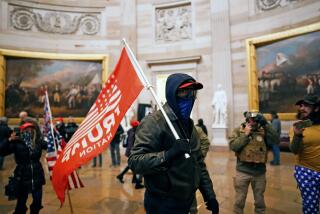Budget Commission Ends in Deadlock : Bipartisan Advisory Panel Issues Differing Reports on Solutions to U.S. Fiscal Crisis
- Share via
WASHINGTON — A high-level advisory group once seen as the best hope for crafting a bipartisan solution to the nation’s budget problems ended up deadlocked, issuing a final report today that splits essentially along party lines.
The seven Republicans on the National Economic Commission and the one Democrat appointed by President Bush endorsed the President’s pledge against raising taxes and praised his budget submission to Congress, calling it a “workable plan for eliminating the deficit” by 1993.
However, the six Democrats on the panel who were appointed by the congressional leadership signed a minority report calling Bush’s budget “neither theoretically sound nor politically realistic.”
The Administration’s $1.16-trillion spending plan for 1990 “rules out any discussion of additional revenues and relies heavily on harsh and disproportionate reductions in domestic spending,” the Democrats said.
The sharply divergent reports echo the debate between Bush and congressional Democrats, in which both sides remain far apart on solutions to a budget crisis that is expected to produce a deficit of $170 billion this year.
Asked if the Administration is disappointed that the panel has failed its mission to come up with a bipartisan formula for reducing the budget deficit, White House spokesman Marlin Fitzwater said:
“They did an excellent job in trying to carry out their mandate. It was a very difficult debate and discussion that they held.
“Some of the things in that report are very useful, and we’ll have to analyze it for a more detailed response,” he added. “They did the best they could,” Fitzwater said.
House Budget Committee Chairman Leon Panetta (D-Calif.) called the commission’s report “disappointing” but said it is not surprising.
“With little support or leadership from the President or the Congress, the commission was unable to face up to the difficult issues,” he said in a written statement. “It had no choice but to punt.”
The commission, which now goes out of existence, was a deep disappointment to supporters, who pushed legislation creating the panel through Congress in the wake of the October, 1987, stock market crash.
Their hopes were that a panel of the nation’s top business, labor and political leaders would be able to agree on a combination of spending cuts and tax increases to solve a deficit problem that has almost tripled the national debt over the last eight years.
While campaigning for the White House, however, Bush was openly critical of the commission, which had the backing of his Republican primary opponent, Sen. Bob Dole (R-Kan.). Bush vowed to reject any final report which called for a tax increase.
The commission’s Democratic co-chairman, Robert Strauss, said that he had “hoped for a great deal more” but that the commission’s fate was sealed by Bush’s campaign against tax increases.
Strauss and Republican co-chairman Drew Lewis had hoped at one time to adopt an ambitious package that would cut $50 billion to $60 billion from the deficit, in part by raising taxes.
Strauss drew criticism from within his own party last fall, however, when he suggested that cuts in government benefit programs, including Social Security, would be needed to balance the government’s books.
More to Read
Get the L.A. Times Politics newsletter
Deeply reported insights into legislation, politics and policy from Sacramento, Washington and beyond. In your inbox twice per week.
You may occasionally receive promotional content from the Los Angeles Times.









